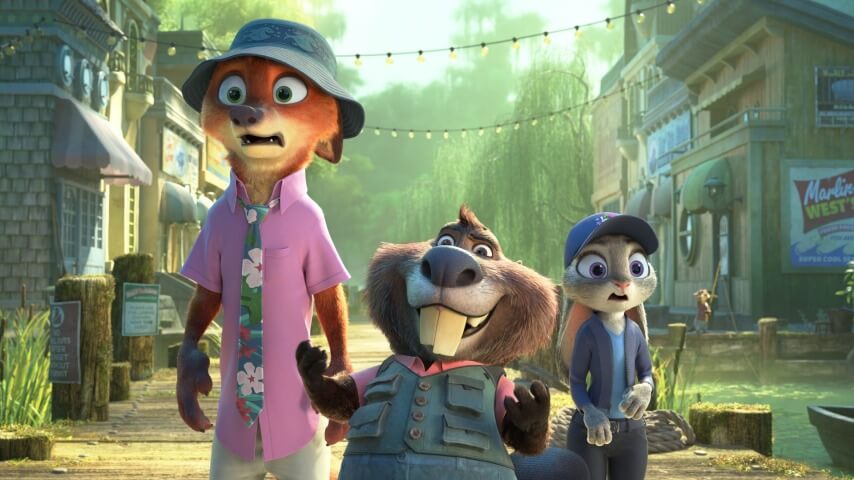This character has popped up more and more over the past few years. There’s Bernie Hayes (Brian Tyree Henry), the conspiracy podcaster who becomes a trusted member of the team in Godzilla Vs. Kong and Godzilla X Kong: The New Empire. There’s the appropriately named “Podcast” (Logan Kim) from the latest Ghostbusters movies, who forms a kinship with conspiracy enthusiast Ray Stantz (Dan Aykroyd). In Roland Emmerich’s Moonfall, conspiracy theorist K.C. Houseman (John Bradley) learns that his belief that the moon is an artificial megastructure is real, and he gets to play hero by luring away an evil AI swarm. And even though he’s not a content creator, Teddy (Jesse Plemons) has his fervid conspiracy beliefs confirmed in Bugonia, further proving that going down YouTube rabbit holes will lead to the truth.
Conspiracy theorists arrive in these films not only because they are underdogs, but because they represent the antithesis of institutional power. If there’s a big, evil force that our heroes must overcome, they can’t go to an institutional power like a newspaper or TV outlet that employs real journalists (this also dovetails with how people have grown increasingly suspicious and skeptical of mainstream media). To simply say these characters are freelance or independent journalists doesn’t feel colorful enough, and still relies on an institution to eventually publish them. These characters get to circumvent all this; they answer to no one but the truth (and their subscribers, who always barely exist).
But this narrative ease never conveys what online conspiracy theorists actually do. It’s easy to present them as offbeat weirdos passionate about the truth. But their reality is more about engagement. Look no further than Alex Jones, who made millions peddling conspiracy theories, was sued into financial ruin by families harmed by his ramblings, and, once he learned that there really might be a cabal of wealthy pedophiles in charge of the government, he dismissed it because the cabal shared his political views.
Even if you dismiss Jones as an extreme example, the foundation of the conspiracy theorist content creator and their platform (YouTube, Spotify, etc.) is to hold viewers’ attention. That means a constant stream of increasingly salacious and enraging claims meant to sow distrust. That doesn’t mean it’s wrong to question authority, but the conspiracy theorist seeks to supplant the authority, making their program the new source for “the truth” that “they” don’t want you to know. Older viewers can find amusement here, understanding the fantasy of an underdog unearthing truth through nothing but determination and an Internet connection. We can also see the tragedy when these characters are proven correct but can’t effect change.
But for Zootopia 2, presenting this character as a good-hearted oddball is particularly noxious. Children don’t understand the economic incentives of content creation, or how these personalities seek to undermine all authority. What kids are going to see is a funny beaver who behaves heroically, guided by her devotion to the truth. While lovable outsiders are nothing new to family movies, Zootopia 2 seeks to normalize this character and her corner of the world by brushing aside the harsh reality of what that world entails. You could argue that kids’ movies do that with all professions, but YouTube is the most popular platform for entertainment among children. When you say “this vlogger spouting conspiracy theories is A) correct, and B) on your side,” it paves the way for kids to consume that real-life content without question.
This is particularly perilous at a time when the truth is more fragile and less valued than ever. President Donald Trump lies like he breathes. Robert F. Kennedy, Jr., the Secretary Of Health And Human Services, changed the CDC website to say that vaccines cause autism, a conspiracy theory meant to topple scientific evidence. The country’s most popular podcaster, Joe Rogan, can’t get enough of conspiracy theories. The 21st century has been marked by conspiracy theorists moving from the fringes of society to the center without losing the façade of the eccentric iconoclast.
These movies don’t include conspiracy theorists because their filmmakers love conspiracy theories. It’s because they love narrative convenience and easy touchstones. But when you normalize a profession that’s designed to warp perceptions of reality under the guise of hunting for the truth, that’s dangerous territory for a kids’ movie. The real Nibbles Maplesticks aren’t passionate about truth. They’re passionate about selling you vitamin supplements while telling you to trust no one.

 Keep scrolling for more great stories.
Keep scrolling for more great stories.
